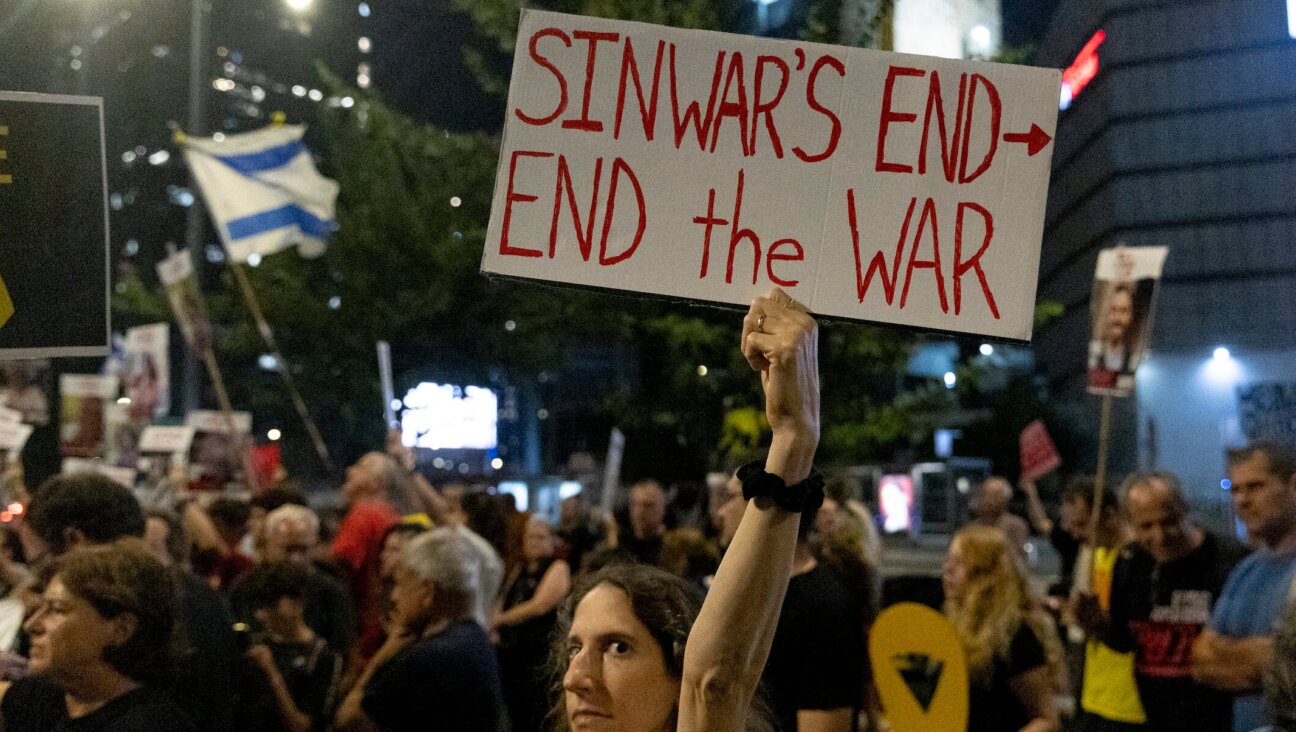What Are You First, Jew or Journalist?

West Bank View: Shuli Moalem-Refaeli addresses journalists at Neve Daniel scenic lookout. Image by Haaretz
Are you a journalist first? Or a Jew first?
Shmuel Rosner, who writes for The New York Times and the L.A. Jewish Journal, asked the provocative question at the opening panel of the Jewish Media Summit, which brought over a hundred journalists from around the Diaspora to Jerusalem in late June.
Had the conference been sponsored by a media organization or a university, Rosner’s question would have echoed throughout the next three days. Because that’s the central tension we in Jewish media face daily: How do we balance our focus on and connection to Jews and Israel with the journalistic demand to search for the truth and to say what we think it means, however uncomfortable that may be?
This isn’t just a Jewish dilemma, of course, but one faced by any serious journalist covering his or her particular community. The digital age amplifies the challenge. Where once we could reasonably expect that our controversial stories and opinion pieces would stay within the family — or whoever bothered to buy a print newspaper or magazine — now they are broadcast to the world, read by others, used by others, for good or ill.
Rosner did manage to draw out a candid answer or two from his panelists.
“The fact that we are Jewish… is second to the imperative of telling the story honestly,” said Jennifer Frazer, comments editor of the Jewish Chronicle in London. “You can only be honest and professional if you are a journalist first.”
Gary Rosenblatt, editor and publisher of The New York Jewish Week, wasn’t willing to go that far. You don’t have to put Jewishness second to do the tough stories, he insisted. It’s not an either/or proposition: “You have to mesh the two.”
But this conference wasn’t sponsored by a media organization or a university. It was sponsored by the Israeli government, which had its purpose and agenda, encapsulated by Prime Minister Benjamin Netanyahu’s own words when he addressed the journalists on the first night. Our job, he exhorted, is to “tell our story to the world but, first of all, to our world, our people.”
I’ve never been on a Federation mission to Israel but I suspect it feels like this.
In Netanyahu’s view, we are Jews and supporters of the state of Israel first, second and third; with journalism as a practice relegated so far down on the list it is barely recognizable. I am sure that government leaders the world over would agree with him, that loyalty should trump skepticism, so Netanyahu cannot be blamed for trying. The fault lay in the very notion that his government, or any government, could bring together journalists and then ignore or gloss over the innate friction between them and the ruling authorities, the people they cover.
I did my best to avoid entanglement; following the Forward’s standard practice to pay our own way, I did not accept the free accommodations nor did I go on any of the sponsored tours (though for an entertaining story about one of them, read Judy Maltz’s account in Haaretz.) I moderated one session, for which I was not compensated. That financial independence also meant I could absent myself from the full program, which I did. I’m much happier doing my own reporting, anyhow.
But my approach was rare if not unique among the 150 or so journalists in attendance, a term that was defined expansively.
There were moments when open dialogue replaced hasbara, propaganda. A panel discussion on covering the Israeli-Palestinian conflict was as rambunctious as it could be, with Palestinian journalists speaking forcefully about the restraints on their practices and Israeli journalists disagreeing with each other vociferously. All the while Nitzan Chen, head of the Government Press Office, listened in the audience.
And since I did not attend every session, I do not know whether that essential question — journalist or Jew? — was ever discussed again.
I can’t help but conclude that an important opportunity was missed here. An ingathering of Jewish media could probe the serious questions we face each day, about how to cover our community while respecting its values, how to inform and connect without denigrating or destroying, how to build trust not based on acquiescence or blind loyalty, but on a quest for truth and a solid belief that we Jews can handle its consequences.
In that spirit, I’ll answer my own question: Journalist first. And I don’t believe that makes me any less of a Jew.
Contact Jane Eisner at [email protected] or on Twitter, @Jane_Eisner
A message from our Publisher & CEO Rachel Fishman Feddersen

I hope you appreciated this article. Before you go, I’d like to ask you to please support the Forward’s award-winning, nonprofit journalism during this critical time.
We’ve set a goal to raise $260,000 by December 31. That’s an ambitious goal, but one that will give us the resources we need to invest in the high quality news, opinion, analysis and cultural coverage that isn’t available anywhere else.
If you feel inspired to make an impact, now is the time to give something back. Join us as a member at your most generous level.
— Rachel Fishman Feddersen, Publisher and CEO























